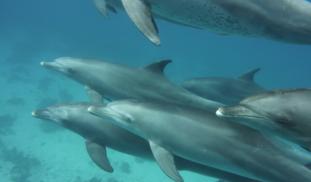Please wait...
About This Project
All animals sleep, but cetaceans engage in unihemispherical sleep, where brainwaves show that only half the brain sleeps at a time. Most studies of cetacean sleep have been in captivity. Reports of confirmed sleeping behaviour in the wild are rare. Expanding on findings of potential sleep behaviour in tagged harbour porpoise, we will review videos of bottlenose dolphins in the Red Sea to see if the same behaviours are present and can be linked to closed eyes: a strong indication of sleeping.
More Lab Notes From This Project

Browse Other Projects on Experiment
Related Projects
Using eDNA to examine protected California species in streams at Hastings Reserve
Hastings Reserve is home to three streams that provide critical habitat for sensitive native species. Through...
How do polar bears stay healthy on the world's worst diet?
Polar bears survive almost entirely on seal fat. Yet unlike humans who eat high-fat diets, polar bears never...
Uncovering hidden insect diversity associated with a likely undescribed gall-forming midge
Does a likely undescribed species of gall-forming midge (pers. comm. Ray Gagné) on Eriodictyon plants (Yerba...


